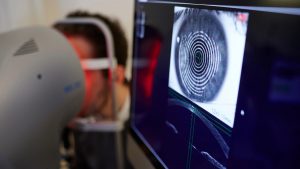Can Gene Therapy Cure Blindness?

In recent years, the phenomenon of new “genetic therapies” and techniques has gained a lot of attention in the media – but is it worth the hype?
From stem cell therapy to so-called “designer babies”, newspaper headlines have touted their fair share of headlines about miracle cures or unethical medical practices over the last few years. But which take is right?
Gene therapy is no doubt a hot topic – but it is equally complex and multi-faceted. As a phenomenon that could have the potential to help millions, we must be able to get the facts straight.
First of all, it is important to note that the vast majority of gene therapy is still in its infancy, with little research and evidence supporting its potential. Having said that, one kind of gene therapy has been proven to be the only potential treatment for a rare eye condition known as Leber’s congenital amaurosis.
This rare life-limiting condition causes the eye to continually deteriorate from birth. As a result, those with the condition can only see in bright light.
One young boy, Creed Pettit from the USA who took part in a clinical trial at the Bascom Palmer Eye Institute in Miami, Florida experienced significant results after undergoing gene therapy treatment. While the study ophthalmologists were initially unsure how much improvement could be expected, Creed’s vision reached 20/30 with glasses in his better-seeing eye. The vision in his worse-seeing eye was also slowly improving.
Understandably, cases like that of Creed Pettit give hope to millions of people suffering from vision-limiting eye conditions. To get a clearer idea of the true potential of this treatment, let’s try to understand what gene therapy actually is and how it works.
What is Gene Therapy?
The term “Gene Therapy” refers to new medical techniques that attempt to use genes to either treat or prevent disease.
Gene Therapy typically works by implanting healthy copies of genetic material into cells. This genetic material is theoretically then able to compensate for abnormal genes that are not functioning properly. For example, if a mutated gene is to blame for a missing or faulty protein, normal copies of this gene may help to restore the protein and encourage normal function.
Advocates for gene therapy research believe that it could be a promising treatment for a number of diseases, including some types of cancer, genetic diseases, and certain viral infections. In reality, however, the technique remains largely experimental with more research needed to determine its safety and efficacy in humans.
The majority of gene therapy research has so far focused on rare and otherwise incurable diseases. Nonetheless, many hope that the future may bring such techniques to the masses, offering an alternative to drug-based treatments and invasive surgeries.
We are still very much in the early days of gene therapy development. While some treatments are slowly emerging in the UK and around the world, the vast majority haven’t yet been sufficiently researched to allow human treatment.
Gene therapy for Age-Related Macular Degeneration (AMD)
In 2019, a clinical trial at the Oxford Eye Hospital aimed to understand the potential of gene therapy for the treatment of age-related macular degeneration (AMD). AMD is a common condition that affects central vision.
The trial involved injecting a synthetic gene into the back of the eye. The hope was that this gene would prevent more cells from dying and stop the progression of the condition.
As reported by the BBC, one of the doctors at the hospital said, “A genetic treatment administered early on to preserve vision in patients who would otherwise lose their sight would be a tremendous breakthrough in ophthalmology and certainly something I hope to see in the near future.”
All participants in the trial were diagnosed with dry AMD – the most common form of the condition. Dry AMD is when the decline in vision is gradual and can occur over many years. As it progresses, dry AMD can develop into wet AMD, in which there is the risk of severe vision loss.
Is Gene Therapy Available?
The trial aimed to initially determine whether the treatment is safe. A participant in a similar trial, however, demonstrated significant improvement in his vision following gene therapy for AMD. Such trials led the way to gene therapy being made available through the NHS to treat blindness associated with some eye diseases.
Another form of gene therapy is also available for the treatment of a rare eye disorder – Choroideremia. In 2016, the same team in Oxford demonstrated that an injection could improve the vision of people with choroideremia.
The condition specifically affects young men whose light-detecting cells in the retina are dying due to a faulty gene. The disorder currently has no treatment or cure, and without gene therapy, it eventually leads to blindness.
In comparison, AMD is a much more common condition, with an estimated 600,000 people affected in the UK alone. In over half of those people, vision is severely impaired, making the development of effective therapies an important area of research.
Hopefully, the continued innovation in this area will lead to a world where vision loss can not only be prevented but even reversed. As part of our mission to contribute to this future, London Vision Clinic is participating in a number of clinical trials for retinal disease.
Find out more, here.
To find out how Laser Eye Surgery could help you or to Book a Consultation today, leave us a comment or get in touch with one of our friendly clinic coordinators.


